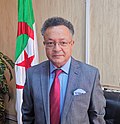This article needs additional citations for verification .(July 2023) |
| Council of Ministers of the People's Democratic Republic of Algeria | |
|---|---|
| مجلس وزراء الجمهورية الجزائرية الديمقراطية الشعبية | |
| Overview | |
| Established | 1958 Provisional Government of Algeria |
| State | Algeria |
| Leader | Prime Minister |
| Appointed by | President of the Republic |
| Responsible to | People's National Assembly |
| Headquarters | El Mouradia Palace, Algiers |
| Website | www |
The Council of Ministers is an Algerian government body established by the Algerian Constitution to discuss and adopt some of the main acts of executive power, such as the tabling of government bills or the appointment of senior officials. It is chaired by the President of the Republic and brings together the Prime Minister, all full-service ministers and, depending on the government, all or some of the lower-ranking ministers. Only a very summary report of the meetings being published, it is also supposed to allow the ministers to freely discuss the policy of the Government. It traditionally meets at El Mouradia Palace, the official residence of the President, although it can be summoned anywhere and at any time by the President. [1]
Contents
- Role
- Juridical competence
- Composition and presidency
- Functioning
- Convocation
- Preparation
- Process
- Other boards and meetings
- Restricted Councils
- Interministerial committees
- Current Cabinet
- 2020 Cabinet
- References
The Council is one of the elements allowing the President of the Republic to direct the executive power despite the great role theoretically assigned to the Prime Minister by the Constitution. It enables it to control the development and implementation of Government policy and to give or refuse its agreement to a certain number of important decisions, and, more generally, to mark its views on discussions involving the whole of the Government. [1]
The Council of Ministers is the only formal meeting of all members of the executive branch of the Government. The President may also chair restricted councils comprising certain ministers. [1]
















